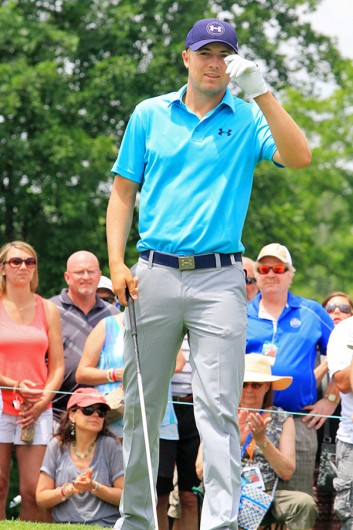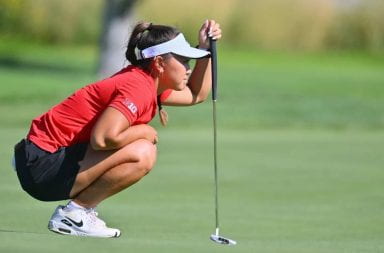
Jordan Spieth tees off during the 2015 Memorial Tournament on June 5 at Muirfield Village Golf Club in Dublin, Ohio. Credit: Samantha Hollingshead / Photo Editor
It might be arduous to envision a weekend where Tiger Woods, Phil Mickelson and Jordan Spieth are competing outside your bedroom window, but for the people of Muirfield Village in Dublin, Ohio, it signifies the Memorial Tournament has begun.
For the past 39 years, the Memorial has served as a global interest, inspired by the history and traditions surrounding the game of golf. Each year since 1976, founder and Ohio State graduate Jack Nicklaus has transported golf royalty into the state, to play in a tournament that gives back in the form of charitable contributions to organizations benefitting struggling adults and children.
The final round of the tournament featured some of the top talents in the game, as it came down to Justin Rose and David Lingmerth in a three-hole playoff. Lingmerth snagged the title for 2015, earning his first career PGA Tour victory as well as collecting $1.1 million and a three-year tour exemption.
But the Memorial offers much more than money and prizes to the people of Columbus. It provides the chance to be within footsteps of some of the most talented golf competitors in the world.
I had the opportunity to cover the event throughout the weekend and follow around some of most successful and exquisite players in the game. However, it was Jordan Spieth, the 2015 Masters champion, who truly surprised me.
Golf is one of the only sports I know where the fans, or rather patrons, actually participate in the game. For those serious enough about it, golf is essentially its own universe. It no longer serves as a pastime — for true players/patrons, it’s a lifestyle.
In game that has been dominated by older, more experienced and already successful players, it’s difficult for the young guys to stand out.
Even though Spieth has only been of the legal drinking age since July, he is without a doubt the real deal.
The Masters champion closed the tournament with a final-day 65 and wound up two shots behind in a tie for third with Francesco Molinari. Spieth started out nine shots behind going into the day and was apprehensive as he imagined spending three extra hours in Ohio.
He chipped in twice, for birdie on the par-5 seventh and for eagle on the par-5 15th, and closed with a birdie. He posted a 13-under 275 and stuck around all afternoon to see if it would be enough.
I learned two things from Spieth: No. 1: never give up, and No. 2: always stay humble and gracious.
Spieth is only 21 years old, and for most of us college-aged individuals, goals are short-sighted. We worry about what bar to go to on Saturday night or how we are going to pass our next exam. Few of us have truly considered becoming a part of history; even fewer have achieved it.
But while most of us spent April in coffee shops and libraries studying, Spieth made history, becoming the youngest golfer to ever win the Masters.
He took on 7,435 yards of terrain and achieved the ultimate goal. If that’s not inspiring, then I’m not sure what is.
He fights for everything and performs to the absolute best of his abilities. After his rounds on Friday, he stayed on the course practicing and practicing, and he never seemed to get tired. Even Saturday morning he was up early warming up and practicing even more to improve his game.
Spieth serves as a role model to all athletes demonstrating that if you really want to be the best, you have to work for it. Talent can only get an athlete so far. It’s the skill of the player after hours and hours of beating on your craft that will truly make you successful.
But his presence on the field showed more than just his pure resilience and passion: It showcased his humble and gracious personality, making it hard to believe his superior status.
After every hole, Spieth would walk up to the next making certain to hit the hands of almost every fan. He made sure the audience understood that he truly appreciated them.
This humble and grateful quality seems to be hidden among most professional athletes buried deep beneath the piles of arrogance. But Spieth was different. He was kind to each person and made you feel as if you were his best friend.
Of course every now and then he would let out a “Gosh darn it!” or “Ah man!” but after every hole he smiled at the spectators. And after all 18, he was generous with interviews, giving full, detailed comments even when he wasn’t satisfied with his performance.
After the interviews, Spieth made it a priority to sign autographs and talk to the fans.
He really understands the importance of the game, and he symbolizes the best part of professional sports: being a role model.
Jordan Spieth is the real deal.


